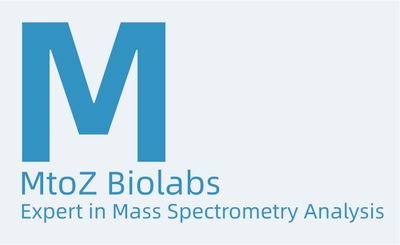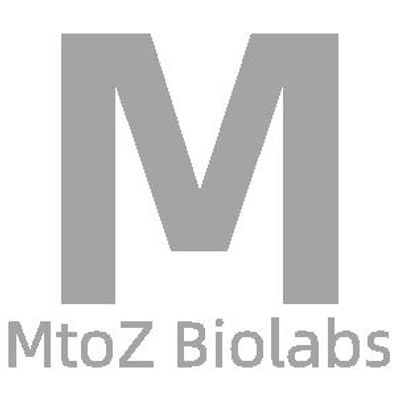

- Home
- Companies
- MtoZ Biolabs
- Services
- MtoZ Biolabs - Short-Chain Fatty Acids ...

MtoZ Biolabs - Model scfa-analysis - Short-Chain Fatty Acids Analysis Service
MtoZ Biolabs is an integrate contract research organization (CRO) providing advanced proteomics, metabolomics, bioinformatics, and biopharmaceutical analysis services to researchers in biochemistry, biotechnology, and biopharmaceutical fields. The name of MtoZ represents “mass to charge ratio” in mass spectrometry analysis, as most of our services are provided based on our well-established mass spectrometry platforms. Our services allow for the rapid and efficient development of research projects, including protein analysis, proteomics, and metabolomics programs.
MtoZ Biolabs is specialized in quantitative multiplexed proteomics and metabolomics applications through the establishment of state-of-the-art mass spectrometry platforms, coupled with high-performance liquid chromatography technology. We are committed to developing efficient, and effective tools for addressing core bioinformatics problems. With a continuing focus on quality, MtoZ Biolabs is well equipped to help you with your needs in proteomics, metabolomics, bioinformatics, and biopharmaceutical research. Our ultimate aim is to provide more rapid, high-throughput, and cost-effective analysis, with exceptional data quality and minimal sample.
Email: marketing@mtoz-biolabs.com
MtoZ Biolabs can provide the following SCFAs:
1. Acetic acid (C2:0)
2. Propionic acid (C3:0)
3. Butyric acid (C4:0)
4. Isobutyric acid (C4:0i)
5. Valeric acid (C5:0)
6. Isovaleric acid (C5:0i)
7. Caproic acid (Hexanoic) (C6:0)
Short chain fatty acids (SCFAs) are a subgroup of saturated aliphatic fatty acids containing 2-5 carbon atoms, with acetate (C2), propionate (C3), and butyrate (C4) being the most abundant. They are the final products of dietary fiber fermented by beneficial coliform bacteria. Humans lack enzymes capable of degrading large amounts of dietary fiber, which passes undigested through the upper gastrointestinal tract into the cecum and colon, where it is fermented by anaerobic microbiota. Fermentation of dietary fiber produces a large number of metabolites, including SCFAs.
For the microbial community, SCFAs are useless end products but are used to maintain redox balance in the gut under anaerobic conditions. In the colon and feces, the molar ratio of acetate, propionate, and butyrate is approximately 60 : 20 : 20. Depending on the diet, the total concentration of SCFAs in the proximal colon ranges from 70 mM to 140 mM. In the distal colon, the concentration is lower, about 20 mM to 70 mM. 95% of the SCFAs produced in the cecum and colon are rapidly absorbed by colonic cells with 5% left in feces.
Previous studies have shown that SCFAs play an important role in the prevention and treatment of a range of metabolic syndromes (such as intestinal diseases and certain cancers). In clinical studies, SCFAs can alleviate certain immune-related intestinal diseases (such as Crohn's disease, ulcerative colitis, and antibiotic-associated diarrhea), although its mechanisms remain to be determined. This suggests that SCFAs can effectively promote energy metabolism in mammals. Excessive energy intake and lack of physical exercise can lead to a range of metabolic syndromes, such as hypertension, obesity, dyslipidemia, and uncontrolled blood sugar. Epidemiological studies have shown that higher dietary fiber intake is beneficial for weight, food intake, and glucose homeostasis, and reduces the risk of metabolic disorders such as diabetes, cardiovascular disease, irritable bowel syndrome, inflammatory bowel disease, and colon cancer. This is closely related to the beneficial SCFAs produced by the fermentation of dietary fiber by intestinal bacteria in the cecum and colon.
The quantity and type of dietary fiber in the diet have a significant impact on the composition of gut bacteria, thereby affecting the type and quantity of SCFAs produced. Generally, the in vivo production rate of SCFAs from different dietary fibers is related to the concentration of SCFAs in the gut with different fiber diets. Although cecal SCFAs concentrations in most model organisms are available, it is difficult to obtain information on their in vivo production rates. In contrast, it is almost impossible to measure cecal SCFAs concentrations in the human gut. Therefore, most of the time, the concentration of SCFAs in feces or in vitro studies is used to evaluate cecal and colonic metabolism. MtoZ Biolabs provides sensitive, reliable, and accurate SCFA detection services. Free project evaluation!
